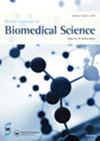Group Assessments to Help Build Online Learning Communities in Biomedical Science Distance Learning Programmes
IF 4.6
4区 医学
Q2 MEDICAL LABORATORY TECHNOLOGY
引用次数: 0
Abstract
Introduction: Biomedical Science distance learning courses offer flexibility in study while in employment. Asynchronous and self-learning approaches are common within such courses and often student-student interaction is limited. The aims of this study were to establish learning communities, develop confidence in participating in online teamwork and foster an appreciation of transferable skills including digital capabilities through remote group activities.Materials and Methods: Two cohorts of students (n = 20/n = 21) were enrolled in a microbiology module of an IBMS accredited MSc distance learning course. Groups of 4–5 students produced a digital output relating to current global infection-related issues, namely, assignment 1, production of a slide deck, which peers could use as learning resources and assignment 2, a voiceover PowerPoint debate, and infographic, voting assessment and peer/self-marking. Students also prepared reflections using written format and a FlipGrid video-recording. A qualitative content analysis was conducted on reflections from all students. Students completed a pre- and post-assignment survey focused on the development of transferable skills for the biomedical sector.Results: Students’ skills and confidence increased following completion of the group assignment, as evident from the pre- and post-questionnaire responses, namely, possession of digital skills and digital creation abilities (29% v 83%), applying for jobs which require digital skills (54% v 89%), talking about examples of using digital media during job interviews (21% v 78%) and demonstration of creativity during assignment tasks (33% v 90%). Critical thinking was more commonly demonstrated during the debate in comparison to the slide deck activity (p = 0.001). The importance of developing digital skills, was higher following completion of the group activities (p = 0.03). Students reflected on the value of the group activities in relation to knowledge acquisition (85%, 86%), collegiality (70%, 71%), digital skills development (80%, 90%), the fact that the activities were enjoyable (70%, 67%) and the development of peer interaction and support (50%, 67%) in relation to assignment 1 and 2, respectively.Discussion: Increasingly digital technologies are being used in the healthcare sector resulting in updated HCPC Standards of Proficiency. This study highlights that virtual group activities promote the establishment of supportive learning communities and the development of transferable skills including digital capabilities for application within the biomedical science workplace.小组评估有助于在生物医学远程学习课程中建立在线学习社区
简介生物医学远程学习课程为在职学习提供了灵活性。在这类课程中,异步和自学方法很常见,而且学生与学生之间的互动往往很有限。本研究的目的是通过远程小组活动,建立学习社区,培养参与在线团队合作的信心,并提高对可迁移技能(包括数字能力)的认识:两批学生(n = 20/n = 21)参加了国际生物医学工程学院认可的理学硕士远程学习课程的微生物学模块。每 4-5 名学生为一组,制作与当前全球感染相关问题有关的数字输出,即作业 1:制作幻灯片,同伴可将其作为学习资源;作业 2:配音 PowerPoint 辩论、信息图表、投票评估和同伴/自我评分。学生还利用书面形式和 FlipGrid 视频录像准备了反思。对所有学生的反思进行了定性内容分析。学生完成了作业前和作业后调查,重点是生物医学领域可迁移技能的发展:完成小组作业后,学生的技能和自信心都有所提高,这一点从作业前和作业后的问卷调查中可以看出,即拥有数字技能和数字创作能力(29% 对 83%)、申请需要数字技能的工作(54% 对 89%)、在求职面试中谈论使用数字媒体的例子(21% 对 78%)以及在作业任务中展示创造力(33% 对 90%)。与幻灯片演示活动相比,辩论中更多地体现了批判性思维(p = 0.001)。完成小组活动后,发展数字技能的重要性更高(p = 0.03)。学生对小组活动价值的反思涉及知识获取(85%,86%)、同事关系(70%,71%)、数字技能发展(80%,90%)、活动令人愉悦(70%,67%)以及与作业 1 和作业 2 相关的同伴互动和支持发展(50%,67%):讨论:数字技术越来越多地应用于医疗保健行业,导致 HCPC 能力标准不断更新。本研究强调,虚拟小组活动促进了支持性学习社区的建立和可迁移技能的发展,包括在生物医学科学工作场所应用的数字能力。
本文章由计算机程序翻译,如有差异,请以英文原文为准。
求助全文
约1分钟内获得全文
求助全文
来源期刊

British Journal of Biomedical Science
医学-医学实验技术
CiteScore
4.40
自引率
15.80%
发文量
29
审稿时长
>12 weeks
期刊介绍:
The British Journal of Biomedical Science is committed to publishing high quality original research that represents a clear advance in the practice of biomedical science, and reviews that summarise recent advances in the field of biomedical science. The overall aim of the Journal is to provide a platform for the dissemination of new and innovative information on the diagnosis and management of disease that is valuable to the practicing laboratory scientist.
 求助内容:
求助内容: 应助结果提醒方式:
应助结果提醒方式:


